- Home
- Elizabeth George
Well-Schooled in Murder Page 4
Well-Schooled in Murder Read online
Page 4
She stared at the needlepoint kneelers that hung against the back of the pew, each one centred with a cross, each one directing her to turn to the Lord to assuage a despair that was without limit. Musty-smelling blue and red hymnals offered her songs of praise and thanksgiving. Dusty silk poppy wreaths hung against the far walls, and even at this distance Deborah could read the signs beneath them. Brownies, Girl Guides, Rangers of Stoke Poges. There was no comfort here.
She left the pew, walked to the altar rail. This too had its message, lettered in yellow onto a faded blue pad that covered the stones: “Come unto me all ye that travail and are heavy laden and I will refresh you.”
Refresh, she thought bitterly, but not change, not cure, and not forgive. There is no miracle here for me, no Lourdes to bathe in, no laying-on of hands, no absolution. She left the church.
Outside, the sun was beginning to set. Deborah retrieved her equipment and retraced her steps down the path towards her car. At the interior lych gate, she turned for a last look at the church, as if it might give her the peace of mind she sought. The setting sun was shooting up final rays of dying light, like an aureole that backdropped the trees behind the church and the crenellated Norman tower that housed its bells.
At another time and without a thought, she would have taken a photograph, capturing the slow change in the sky’s hue as the day’s death intensified the sunset. But at this moment she could only watch the light’s beauty fade and fail, and she knew she could no longer avoid the homecoming and Simon’s unsuspecting, unconditional love.
Across her path just inches from her feet, two squirrels scampered, chattering angrily. They were spoiling with one another over a tidbit of food, each determined to be victor in the fray. They raced round the side of an elaborate marble tomb at the graveyard’s edge and scrambled onto the waist-high flintstone wall that separated the church property from the back field of a local farm, screened off by several heavy-limbed conifers. Back and forth they flew along the top of the wall, first one then the other surging into the attack. Paws, teeth, tiny legs all embroiled in a fight as the cherished food dropped onto the ground below.
It was the diversion Deborah needed. “Here, no!” she said. “Don’t fight. Stop it! Now!”
She approached the two animals and, seeing her coming, they fled over the side of the wall and up into the trees.
“Well, at least that’s better than fighting, isn’t it?” she said, looking up into the branches that overhung the graveyard. “Behave yourselves now. It’s not polite to quarrel. It’s not even the place.”
One of the squirrels was tucked into the joint of a branch and the tree trunk. The other had disappeared. But the one that remained watched her with bright eyes from his position of safety. After a moment, feeling secure, he began to groom himself, rubbing paws sleepily over his face as if he intended to nap.
“I wouldn’t be so sure of myself if I were you,” Deborah warned. “That little bully is probably waiting for just this sort of opportunity to pounce again. Where do you suppose he’s gone?”
She started to look for the other squirrel, moving her eyes along the branches fruitlessly and then dropping them after a time to the ground.
“You don’t think he’s clever enough to—”
Her voice died. Her mouth was instantly dry. Words fled. Thoughts dissolved.
A child’s naked body was lying beneath the tree.
3
Horror immobilised her. It was a shaft of ice driven down the length of her spine, rooting her to the spot. Details intensified, impelled into her brain by the force of shock.
Deborah felt her lips part, felt the rush of air distend her lungs with an unnatural force. Only a terrified shriek could dispel the air fast enough, before her lungs burst and left her helpless.
Yet she couldn’t cry out and even if she did so, there was no one nearby to hear her. So she only whispered, “Oh God.” Then uselessly, “Simon.” And then, although she didn’t want to do so, she stared, hands drawn into fists and muscles coiled, ready to run if she had to, when she could.
The child was lying partially on its stomach just beyond the flintstone wall in a bed of bloomless creeping jenny. By the length and the cut of hair it appeared to be a boy. He was very dead.
Even if Deborah had been silly enough or hysterical enough to convince herself that he was merely asleep, explaining why he would be sleeping completely naked in a late afternoon growing colder by the minute was an impossibility. And why under a tree in a copse of pines where the temperature was even lower than it would be had he sought out the last rays of the afternoon sun? And why would he sleep in that unusual position, with his right hip taking the burden of his weight and his legs splayed out, and his right arm twisted awkwardly so that it was doubled up beneath itself, and his head turned to the left with three quarters of it pressed into the ground, into the creeping jenny? Yet his skin was quite flushed—very nearly red—and surely that indicated warmth, life, the pulse and flow of blood….
The squirrels resumed their bickering, racing down the tree that had sheltered them, scampering over the inert form near the trunk. The tiny claw of the lead squirrel caught at the flesh of the child’s left thigh, held, and made the animal a prisoner. Wild chattering erupted, companion to a frantic scramble for freedom. The proximity of his pursuer gave fire to the squirrel’s need to escape. The child’s flesh tore. The animal vanished.
Deborah saw that no blood seeped from the wound the claw had made, small though it was. That seemed momentarily odd until she remembered that the dead do not bleed. Only the living have that pleasure.
At last she cried out, spinning away. But every impression stayed so vividly before her that she knew she might as well have gone on staring forever. A leaf caught in hair the colour of walnuts; a crescent scar cradling the left kneecap; a pear-shaped birthmark at the base of the spine; and running along the length of the visible parts of the left side of the body, an odd bruising of the flesh, as if the child had been hurled down on his side sometime in the past.
He could have been asleep. He should have been asleep. But even Deborah’s brief viewing of him from a distance of two yards had allowed her to see the telling abrasions at his wrists and ankles: stark white flecks of dead skin against a background that was red and inflamed. She knew what that meant. She guessed what the uniform circular burns along the tender flesh of his inner arm meant as well.
He wasn’t asleep. Death had not come to him as a friend.
“God, God.” she cried out.
Her words gave her sudden, unexpected strength. She ran towards the car park.
Simon Allcourt-St. James pulled his old MG next to the police line that had been set up at the entrance to the car park of St. Giles’ Church. Briefly his headlamps shone upon the white face of a young, very gawky police constable who maintained a duty post there. He seemed an unnecessary appurtenance, for although the church did not stand in complete isolation, the houses in the surrounding neighbourhood were not closely situated to it, and no curious crowd had gathered upon the road.
But it was Sunday, St. James recalled. Evensong was due to be celebrated within the hour. Someone would have to be present to turn the faithful away.
Down the narrow lane that led into the car park, he could see an arc of lights where the incidents room had been set up by the police. A stark blue flashing broke into the white illumination there with a steady, pulsating rhythm. Someone had allowed a police car’s light to continue to whirl, disregarded, on its roof.
St. James switched off the MG’s ignition and released the hand grip that operated the clutch. He got out of the car awkwardly, his braced left leg landing at an irritating angle that put him off balance for a moment. The young constable watched him right himself, his face wearing an expression that said he was unsure whether to go to the other man’s assistance or warn him off the grounds. He chose the latter. It was more within his purview.
“Can’t stop here, sir,” he barked.
“Police investigation in progress.”
“I know, Constable. I’ve come for my wife. Your DI phoned me. She found the body.”
“You’ll be Mr. St. James, then. Sorry, sir.” The constable unabashedly examined the other man as if this would allow him to verify his identity. “I didn’t recognise you.” When St. James did not make an immediate reply, the young man seemed to feel compelled to continue. “I did see you on the news last week, but you didn’t—”
St. James interrupted. “Of course.” He anticipated the rest of the embarrassed words that halted from the constable’s mouth. On the news, you didn’t look crippled. Certainly not. Why ever should he? Standing on the steps of the Old Bailey, submitting to an interview about the recent use of genetic fingerprinting in a court of law, why should he look crippled? The camera was kept on his face. It didn’t make a study of the worst that fate had done to his body.
“Is my wife in the incidents room?” he asked.
The constable waved in the direction of a driveway across the road. “They’ve kept her in the house over there. That’s where she made the call to us.”
St. James nodded his thanks and crossed the road. The house in question stood a short distance behind two wrought-iron gates that hung open from a brick wall. It was a nondescript building with a pantiled roof, a three-car garage, and white curtains—all of identical pattern—at the windows. There was no front garden, only a wide expanse of driveway edging a hillock that, along with the wall, shielded the house from the road. The front door was a single sheet of opaque glass framed in white wood.
When St. James rang the bell, the door was opened by another constable, this one a woman. She directed him to the sitting room at the back of the house, where four people sat on chintz-covered chairs and a sofa surrounding a coffee table.
St. James paused in the doorway. The scene before him was like a tableau consisting of two men and two women who posed in a study of gently probing confrontation. The men wore their police identities like suits of clothes even though neither was in uniform. They leaned forward in their chairs, one with a notebook and the other with a hand extended as if to emphasise some remark. The women sat without speaking or looking at one another, perhaps in the expectation of further questions.
One of the women was a girl of not more than seventeen. She wore a shapeless terry robe stained with chocolate on one of its cuffs and a pair of thick woollen socks that were overlarge and dusty-bottomed. She was small, excessively pallid, and her lips were cracked as if from exposure to harsh wind or sun. She was not unattractive; rather she was sweet-looking in a wispy sort of way. But it was clear that she was unwell. Next to her fleeting prettiness, Deborah was like fire with her mass of flaming hair and ivory skin.
Although St. James had wanted to go to his wife several times during her trip, Deborah had refused his offers to meet her both in Yorkshire and in Bath, so he had not seen her for a month. Instead, he had only spoken to her on the telephone, in conversations that, with the passing weeks, had grown more and more strained and difficult to complete. Each time her hesitant speech revealed to him the extent to which she continued to mourn the child they had lost, but she would not allow him to speak of it to her, saying only, “Please, no,” when he tried. As he saw her now, absorbing her presence as if presence alone could bind her to him once again, he realised that he had never understood until this moment the terrible risk attendant to giving his love to Deborah.
She looked up and saw him. She smiled, but he read the heartache in her eyes. They had never been able to lie to him. “Simon.”
The others looked in his direction and he came into the room, crossed to his wife’s chair, touched her bright hair. He wanted to kiss her, to hold her, to infuse her with strength. But he only said, “You’re all right?”
“Of course. I don’t know why they phoned you at all. I can certainly get back to London on my own.”
“The DI said you weren’t looking very well when he got out here.”
“The shock, I suppose. But I’m well enough now.” Her appearance belied the words. There were dark circles under her eyes, and her clothes hung upon her loosely, testament to the amount of weight she had lost in the last four weeks. Seeing this, St. James felt a prickling of fear.
“Just a minute more, Mrs. St. James, and you can be on your way.” The older policeman, probably a sergeant who’d been assigned the duty of preliminary enquiries, turned his attention to the girl. “Miss Feld,” he said. “Cecilia, if I may?”
The girl nodded, her face chary, as if the request to use her given name were the kind of liberty that led to a trap.
“You’ve been ill, I take it?”
“Ill?” The girl seemed oblivious of the fact that her choice of clothing at six o’clock in the evening was hardly apt to suggest anything other than ill health. “I…no, I’m not ill. I’ve not been ill. Perhaps a bit of flu, but not ill. Not really.”
“Then we can take you one last time through everything,” the policeman said. “Just to make certain we’ve the facts straight and proper?” He phrased it as a question, but no one thought it was anything other than an indication of what would happen next.
Cecilia’s overall appearance suggested that going through another round of parry and thrust with the police was the last thing she could bear at the moment. She looked sapped and worn. She crossed her arms in front of her, and lowered her head to examine them as if she were surprised by their presence. Her right hand began to move on her left elbow: up, down, and around in what could have been mistaken for a caress.
“I don’t think I can be any more helpful than I’ve been already.” She attempted patience, but the effort sounded strained. “The house is well off the road. You can see that for yourself. I didn’t hear a thing. I’ve not heard a thing for days. And I’ve certainly not seen anything. Not anything suspicious. Not anything to suggest a little boy…a little boy…” She stumbled on the words. Her hand stopped its caress of her elbow for a moment. Then it resumed.
The second policeman wrote laboriously with the stub of a pencil. If he had taken all this down earlier in the evening, he was not giving any sign of having heard it before.
“You understand why we need to ask you this, though,” the sergeant said. “Your house is closest to the church. If anyone had the opportunity to see or hear the killer’s movements, it would have been you. Or your parents. You say they’re not here at the moment?”
“They’re my foster parents,” the girl corrected. “Mr. and Mrs. Streader. They’re in London. They’ll be back sometime this evening.”
“Were they here this weekend? On Friday and Saturday?”
The girl glanced towards the fireplace and the overmantel, on which a set of photographs were displayed. Three of them were of young adults, perhaps grown children of the Streaders’. “They went into London yesterday morning. They’re spending the weekend helping their daughter settle into her new flat.”
“Here alone quite a bit, are you, then?”
“No more than I like to be, Sergeant,” she responded. It was a strangely adult reply, spoken not so much with assurance as with a listless acceptance of an immutable fact.
The despondency in her answer prompted St. James to question the girl’s presence in this place. It was comfortable enough and bore the appointments one would expect in a home deemed lived-in rather than fashionable. Good furniture filled the room; a nubby wool carpet covered the floor; watercolours decorated the wall; a stone fireplace held a basket of silk flowers arranged with more enthusiasm than artistic technique. There was a large television with a video recorder on a shelf beneath it. Plenty of books and magazines lay about, offering to occupy one’s idle time. But by her own admission the girl was an outsider, even if the mantel photographs had not identified her as such, and the emptiness with which she spoke suggested that she was an outsider everywhere else as well.
“But you can hear noise from the road, can’t you?” the sergeant insisted. “Even
as we sit here, cars go by. One can tell.”
They all listened for a demonstration of this fact. As if on cue, a lorry rumbled past.
“It’s not something one remembers, is it?” the girl replied. “Cars go by on streets all the time.”
The sergeant smiled. “Indeed they do.”
“You seem to be suggesting that a car was involved. But how can you know that? You’ve said this boy’s body was in the field behind the church. It seems to me that it could have got there several other ways, none of which I would have noticed even if I—or the Streaders or any of our neighbours—had been sitting on the verge the weekend through.”
“Several other ways?” the sergeant said amiably, his interest aroused by this admission of knowledge.
The girl replied, “Through the back field itself by means of the farm. Through Gray’s field, for that matter, next to the church.”
“Did you notice anything to indicate that, Mrs. St. James?” the sergeant asked.
“I?” Deborah looked flustered. “No. But I didn’t look for anything. I wasn’t thinking. I’d come to photograph the graveyard and I was preoccupied. All I remember is the body. And the position. As if he’d been dumped like a sack of flour.”
“Yes. Dumped.” The sergeant examined his hands. He said nothing more. Someone’s stomach growled loudly, and although the other policeman did not raise his head, he looked abashed. As if the sound had reminded him of where they were and what they were doing and how long they’d been at it, the sergeant got to his feet. The others did likewise.
“We’ll have statements for the both of you to sign tomorrow,” the sergeant said to the women. He nodded and left them. His companion followed. In a moment, the front door closed.
St. James turned to his wife and could see Deborah’s reluctance to leave Cecilia alone, as if the past hour had drawn them together in some obscure way.

 Well-Schooled in Murder
Well-Schooled in Murder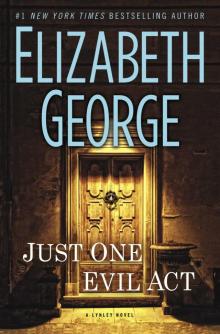 Just One Evil Act
Just One Evil Act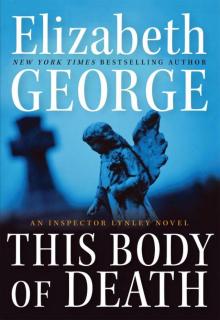 This Body of Death
This Body of Death The Edge of the Water
The Edge of the Water For the Sake of Elena
For the Sake of Elena Believing the Lie
Believing the Lie The Edge of the Shadows
The Edge of the Shadows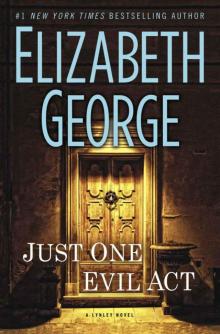 Just One Evil Act: A Lynley Novel
Just One Evil Act: A Lynley Novel In Pursuit of the Proper Sinner
In Pursuit of the Proper Sinner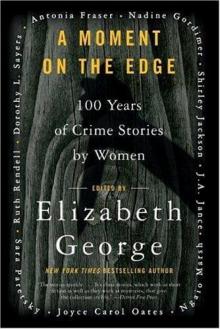 A Moment on the Edge:100 Years of Crime Stories by women
A Moment on the Edge:100 Years of Crime Stories by women Elizabeth I
Elizabeth I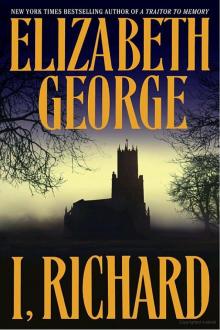 I, Richard
I, Richard A Traitor to Memory
A Traitor to Memory Missing Joseph
Missing Joseph A Suitable Vengeance
A Suitable Vengeance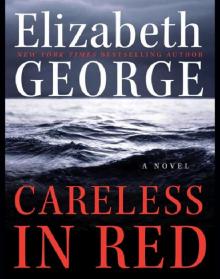 Careless in Red
Careless in Red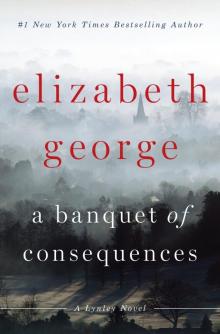 A Banquet of Consequences
A Banquet of Consequences Playing for the Ashes
Playing for the Ashes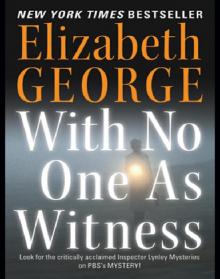 With No One As Witness
With No One As Witness Deception on His Mind
Deception on His Mind The Best American Mystery Stories 2016
The Best American Mystery Stories 2016 A Great Deliverance
A Great Deliverance In the Presence of the Enemy
In the Presence of the Enemy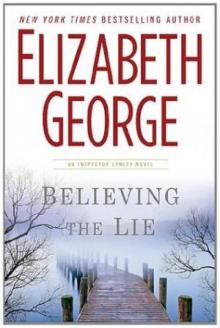 Believing the Lie il-17
Believing the Lie il-17 The Edge of the Light
The Edge of the Light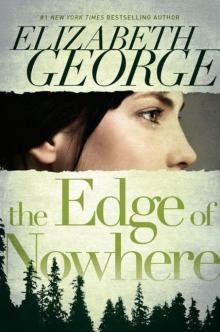 SW01 - The Edge of Nowhere
SW01 - The Edge of Nowhere A Place of Hiding
A Place of Hiding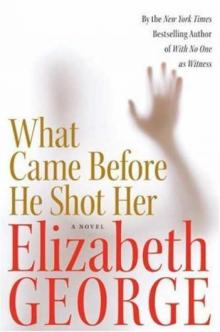 What Came Before He Shot Her il-14
What Came Before He Shot Her il-14 Payment In Blood
Payment In Blood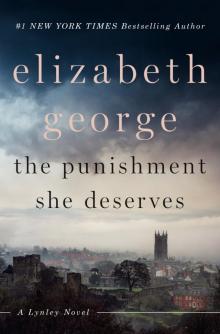 The Punishment She Deserves
The Punishment She Deserves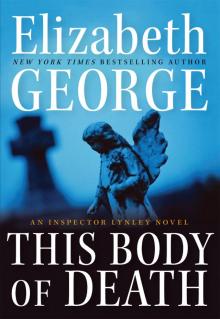 This Body of Death: An Inspector Lynley Novel
This Body of Death: An Inspector Lynley Novel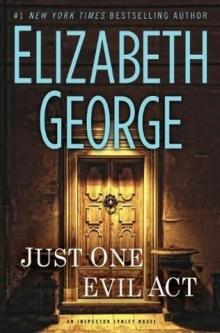 Just One Evil Act il-18
Just One Evil Act il-18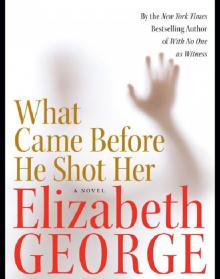 What Came Before He Shot Her
What Came Before He Shot Her Missing Joseph il-6
Missing Joseph il-6